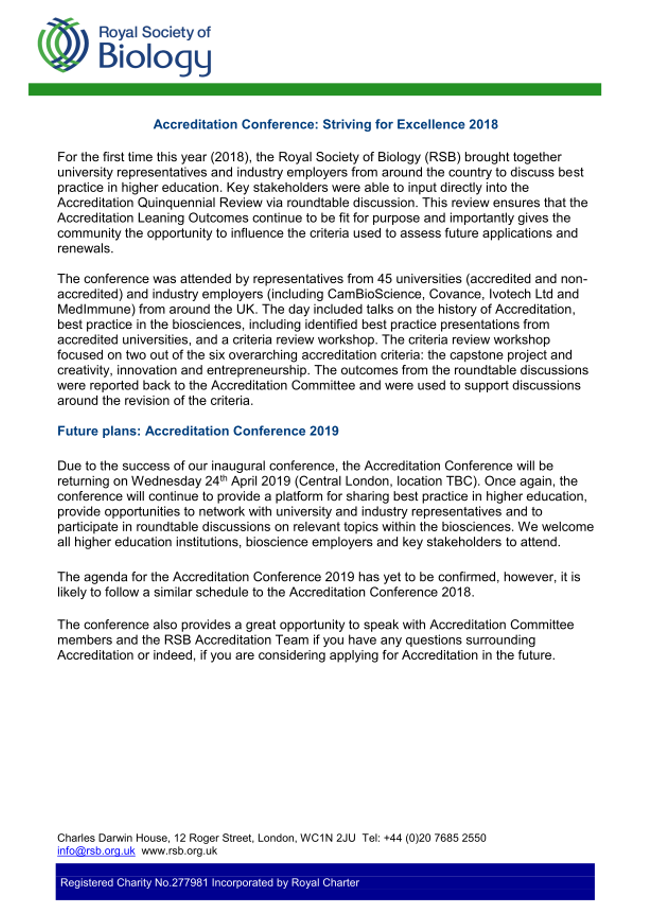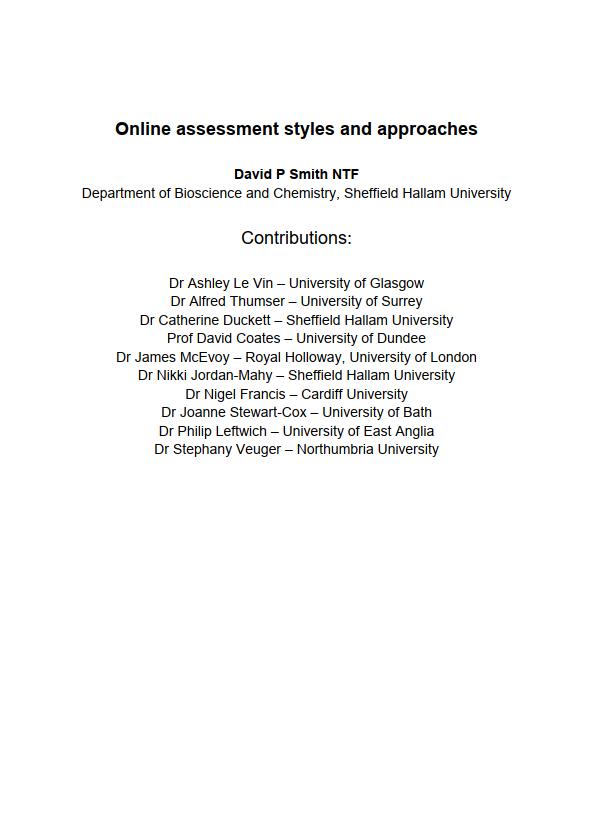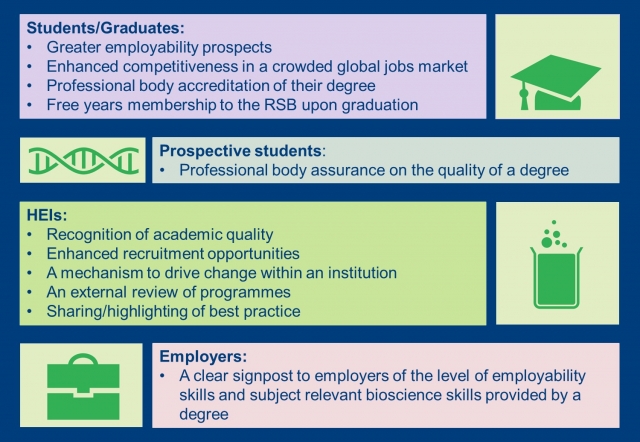
Degree Accreditation is acknowledgement by an external body, that a degree programme meets a defined set of overarching criteria. Accreditation by the Royal Society of Biology recognises and supports the advancement of skills and education in the biosciences, throughout the UK and internationally. Graduates from accredited degree programmes are equipped with well-rounded knowledge and skill sets, making them highly employable both within and beyond their chosen field.
Lots of other organisations also accredit degree programmes, including the Institute of Physics and the Royal Society of Chemistry. Some, such as the Institute of Biomedical Science, are looking for degrees that meet specific requirements for programme content and enable you to gain professional registration.
Benefits of Accreditation to Key Stakeholders
Awards and Events
Degree Accreditation Awards Ceremony:
To celebrate biosciences in higher education, the Royal Society of Biology hosts an annual Degree Accreditation Awards Ceremony. The evening Awards Ceremony celebrates universities who have been awarded accreditation over the last year.
In addition, the ceremony showcases the achievements of graduates from accredited degree programmes who have received the best marks in their final year projects. The ceremony offers a unique platform for all invited to connect with top bioscience graduates and network with academics, leaders and decision makers from industry and government, from across the UK.
Accreditation Conference: Striving for Excellence:
 In 2018, the inaugural Accreditation Conference saw university representatives and industry employers, from across the country, discuss best practice in higher education. Key stakeholders were able to directly input into the Accreditation Quinquennial Review via round table discussions. This review ensured that the Accreditation Learning Outcomes continue to be fit for purpose and gave the community the opportunity to influence the criteria used to assess future applications and renewals.
In 2018, the inaugural Accreditation Conference saw university representatives and industry employers, from across the country, discuss best practice in higher education. Key stakeholders were able to directly input into the Accreditation Quinquennial Review via round table discussions. This review ensured that the Accreditation Learning Outcomes continue to be fit for purpose and gave the community the opportunity to influence the criteria used to assess future applications and renewals.
In 2019, over 100 delegates attended the Accreditation Conference in London. Due to COVID-19, the conference was postponed in 2020 but returned in an online format on 27th April 2021.
Recordings from the 2021 conference can be found here.
Sharing of Good Practice Event:
In 2017, we brought people together from across a nation – in this case Scotland - and shared the good practice identified in the accreditation visits to five universities.
Accreditation Committee
The Accreditation Committee (AC) develops and oversees Accreditation on behalf of the Royal Society of Biology Council. The AC is responsible for assessing all applications, carrying out site visits to the HEIs, and is authorised by Council to award accreditation to qualifying programmes.
History of RSB Accreditation
The Royal Society of Biology initiated the development for accreditation of bioscience degrees in 2010. The Royal Society of Biology received input from:
- Universities
- Business & Industry
- Government
- Learned Societies
- Research Councils
- Funding Bodies
- Sector Skills Councils
This led to a two year consultation period, including a survey of undergraduate and postgraduate students studying the life sciences in the UK, and recent graduates. 90% of respondents felt that it was important to gain work experience during their studies. Advanced Accreditation was launched in October 2012 which was supported by Government funding from the UK Commission for Employment and Skills (UKCES).
Due to the success of Advanced Accreditation and requests from the wider community, the Society developed Accreditation, addressing the skills gaps identified by employers for graduates from traditional bachelor's degrees, launched in March 2015.
The Royal Society of Biology Accreditation Programme now includes Accreditation, Advanced Accreditation, International Accreditation, Master's Accreditation, Foundation Degree Accreditation and Doctoral Training Accreditation.
Accreditation is not about the wide recognition of threshold standards, nor does it make judgements on the wide range of excellent degrees delivered by UK higher education institutions (HEIs).
Online Assessment Styles and Approaches
 Following changes to exam assessment due to the COVID-19 pandemic, many universities have continued with online assessment approaches. As a result, the RSB wanted to be able to give advice to universities about appropriate assessment styles for problems and open questions which are less subject to collusion, copying and downloading, and which could be used to fairly assess understanding rather than just knowledge.
Following changes to exam assessment due to the COVID-19 pandemic, many universities have continued with online assessment approaches. As a result, the RSB wanted to be able to give advice to universities about appropriate assessment styles for problems and open questions which are less subject to collusion, copying and downloading, and which could be used to fairly assess understanding rather than just knowledge.
Dr David Smith, Sheffield Hallam University, was selected to produce some guidance on online assessment styles and approaches. This guidance document can be downloaded by clicking on the image to the left.
Supporters of Accreditation





